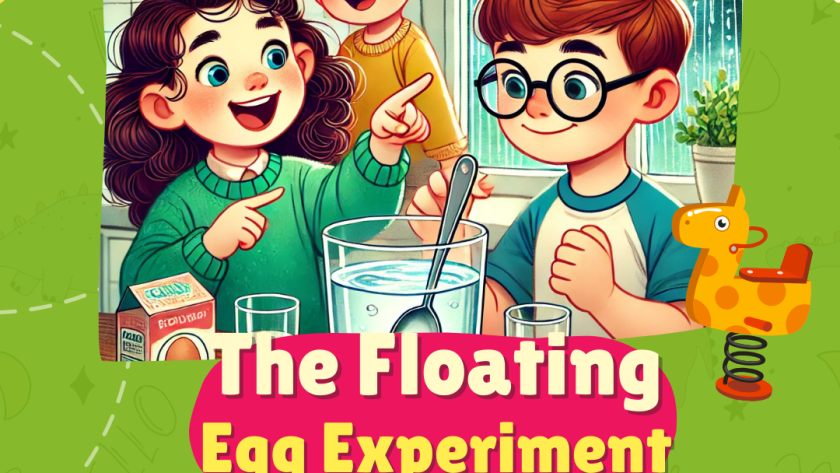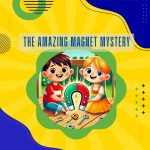The Floating Egg Experiment by EasyReadStories.com – 569 words
On a rainy afternoon, the Science Club trio—Sam, Ivy, and Raj—decide to try a fascinating experiment they find in a book: making an egg float in water. After a few trial-and-error moments, including forgetting to stir the salt and accidentally cracking an egg, the kids succeed in creating a floating egg. With the help of Sam’s older brother Marv, they learn that adding salt to water makes it dense enough to push the egg up. Eager to learn more, they experiment with other objects like a pencil, a paperclip, and a plastic ball to see what sinks or floats. Although sugar water doesn’t work the same way, the trio discovers the joy of curiosity and learning. Inspired, they plan their next science experiment.
Why This Is a Good Story for Young Readers:
- Simple Language and Clear Concepts:
The story uses age-appropriate vocabulary and short sentences, making it accessible to beginning readers while introducing a scientific concept—density—in a fun way. - Relatable Characters and Setting:
The trio’s curiosity, teamwork, and occasional mistakes mirror real-life experiences, helping young readers connect with the story and feel encouraged to try experiments themselves. - Engages Curiosity and Critical Thinking:
By exploring what sinks and floats, the story encourages kids to ask questions, test ideas, and observe outcomes—essential early science skills. - Humor and Playfulness:
Moments like the cracked egg and the “egg soup” mess add lighthearted humor, keeping readers entertained while they learn. - Positive Themes:
The story emphasizes perseverance, curiosity, and learning through trial and error, teaching kids that mistakes are part of discovery. - Encourages Hands-On Exploration:
This story is a springboard for readers to recreate the floating egg experiment at home, fostering active learning and excitement about science. - Inclusion of Family Dynamics:
Marv, the older brother, adds a layer of mentorship, showing how learning can happen in everyday interactions and strengthening the story’s appeal to families.
This story is an excellent mix of education, fun, and inspiration for young readers just starting to explore the world of science!
The Floating Egg Experiment
It’s a rainy afternoon, and the Science Club trio—Sam, Ivy, and Raj—are sitting at Sam’s kitchen table. The rain taps against the window, but inside, the kids are flipping through a book called Awesome Kitchen Science Experiments.
“Look at this one!” Ivy says, pointing to a colorful picture. “It says we can make an egg float in water!”
“No way!” Raj says, leaning closer. “Eggs always sink. How does that work?”
Sam grins. “Only one way to find out. Let’s try it!”
The Setup
The trio gathers supplies: a clear glass, water, salt, and an egg. Ivy carefully fills the glass with water, while Raj measures out spoonfuls of salt.
“How much salt do we need?” Ivy asks.
“Enough to make magic,” Sam says, pretending to sprinkle salt like a wizard.
Raj stirs the water, but in his excitement, he only stirs for a second. “Done!” he says.
Ivy lowers the egg into the glass, and they all lean in close. The egg drops straight to the bottom.
“Hmm,” Sam says, scratching his head. “I thought it was supposed to float.”
The Messy Moment
“Let’s try more salt,” Ivy suggests. She scoops in two more big spoonfuls. Raj grabs the spoon and stirs quickly, but when Ivy places the egg back in the glass—CRACK!
The egg splits open, and yellow yolk swirls into the water.
“Oops,” Ivy says, giggling.
Raj groans. “Now we have egg soup!”
Sam grabs a towel to clean up. “Let’s try again, but this time, stir the salt really well before putting in the egg.”
Success!
On their second try, Raj stirs the salt carefully until it’s completely dissolved. Ivy gently lowers the egg into the glass.
“Look!” she shouts.
The egg rises slowly and hovers in the middle of the glass. It floats!
“That’s amazing!” Raj says, clapping his hands.
Sam’s older brother, Marv, walks by and notices their excitement. “Want to know why that works?” he asks.
The trio nods eagerly.
Marv picks up the salt container. “Salt makes the water denser, or heavier. When the water is dense enough, it can push the egg up, making it float.”
“So it’s like the egg gets a water raft?” Ivy asks.
“Exactly,” Marv says with a grin.
More Experiments
“Let’s try other things to see if they float!” Raj says, grabbing a pencil from the table.
They test a pencil, a paperclip, and a tiny plastic ball.
“The pencil floats, but the paperclip sinks,” Sam says.
“And the ball floats too!” Ivy adds.
“What about sugar water?” Raj suggests.
The kids mix sugar into water and try the egg again. But no matter how much sugar they add, the egg keeps sinking.
“Why doesn’t it work with sugar?” Ivy wonders aloud.
Marv pokes his head back into the room. “Sugar doesn’t make water dense enough to float an egg. Salt is special like that.”
The Big Idea
By the end of the day, the trio is thrilled. They’ve tested the egg, learned about density, and experimented with different items.
“Being curious really pays off,” Ivy says.
“Yeah,” Raj agrees. “We figured out something cool and made a huge mess!”
Sam laughs. “What should we try next? How about making a homemade volcano?”
The other two cheer, ready for their next science adventure.



